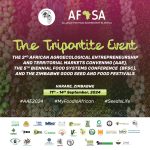WE, the more than 400 delegates, comprised of farmers, youth, women, entrepreneurs, researchers, CSOs, and policy actors, attending the Tripartite Event on African Agroecological Entrepreneurship, the Harare Seed and Food Festival, and the 5th Biennial Food System Celebration held in Harare, Zimbabwe from 11th to 14th September 2024, under the theme ‘Celebrating Our Healthy African Food Heritage’, hereby make this ‘Harare Declaration of Commitment and Call to Action’ for advancing agroecology and agroecological entrepreneurship in Africa.
WE THANK the Government and People of Zimbabwe for the warm welcome and support we have received during this event. We also appreciate PELUM Zimbabwe, AFSA, and their partners for making this event possible, and urge them to continue supporting the development of agroecology and agroecological entrepreneurship in Africa.
WE CELEBRATE the connection with the spirits of our ancestors and commit to sustainably care for our land, ensuring we pass this inheritance to future generations in the same way it was passed to us by those who came before.
WE NOTE THAT:
- Industrial agricultural development approaches to food security have not only failed to achieve the goal of food and nutrition security, but also pose serious challenges to human and environmental health.
- Agroecology provides a sustainable pathway for producing food that respects and conserves our soils, culture, identity, and social relationships; agroecological entrepreneurship enables the exchange of seeds and food within and across national borders, ensuring sustainable access to agroecologically produced foods.
- Our food heritage consists of more than just the ingredients we use to prepare it. It embodies our values, our connection to the land, our ties to our ancestors, and serves as a source of identity and pride.
- Embracing traditional food systems offers pathways to sustainable practices that honor the past while also forging a resilient future.
- Access to finance remains a major challenge for agroecological entrepreneurs, but there are emerging opportunities for funding. However, more needs to be done to support entrepreneurs in accessing these resources
COMMITMENT
In order to sustain and promote agroecology across Africa, WE COMMIT INDIVIDUALLY AND COLLECTIVELY TO:
- Collaborate within the framework of AFSA and with farmers, policymakers, researchers, and communities to address the multifaceted challenges facing our food systems, with the aim of ensuring sustainable production and access to healthy food for physical well-being and economic vitality within our countries, across Africa, and globally.
- Strengthen networks of agroecological farmers and entrepreneurs within and across national borders in Africa, and with counterparts in other parts of the world, to promote learning, exchange, and enhance our ability to influence policies.
- Work closely with children and youth to ensure the intergenerational transfer of agroecological knowledge within our communities.
- Raise awareness among farmers and citizens about the threats posed by industrial agriculture and the benefits of agroecology.
- Empower farmers and communities through training, capacity building, and policy and institutional support for agroecology and agroecological entrepreneurship.
- Provide opportunities, spaces, and support for women and youth to actively engage with agroecology and agroecological entrepreneurship.
- Support training and capacity-building efforts to enable agroecological farmers to produce high-quality products sustainably.
- Increase practical, farmer-based research on agroecology and agroecological entrepreneurship to highlight key principles, address challenges, and promote innovation.
CALL TO ACTION
To actualize the contribution of agroecological entrepreneurship and territorial markets, we call upon governments, funders, and other stakeholders to take the following actions:
- Recognize and support agroecology as a pathway for agricultural development and food security across Africa.
- Establish and enforce standards and certification mechanisms for agroecologically produced foods and other products that are recognized across national borders.
- Support agroecological farmers through public procurement schemes, such as school feeding programs.
- Provide policy and legal recognition and support for farmer-managed seed systems.
- Support agroecological farmers with post-harvest handling and storage to ensure health and competitiveness.
- Provide policy incentives for financial service providers to support agroecology and agroecological entrepreneurship.
- Build specific territorial markers for agroecologically produced foods and other products.
- Ensure the integration of agroecology into the post-Malabo Framework of the African Union.
DECLARATION MADE AT HARARE ON THIS 14TH DAY OF SEPTEMBER, 2024


































[…] Interested in the Harare Declaration of Commitment and Call to Action? Click here. […]